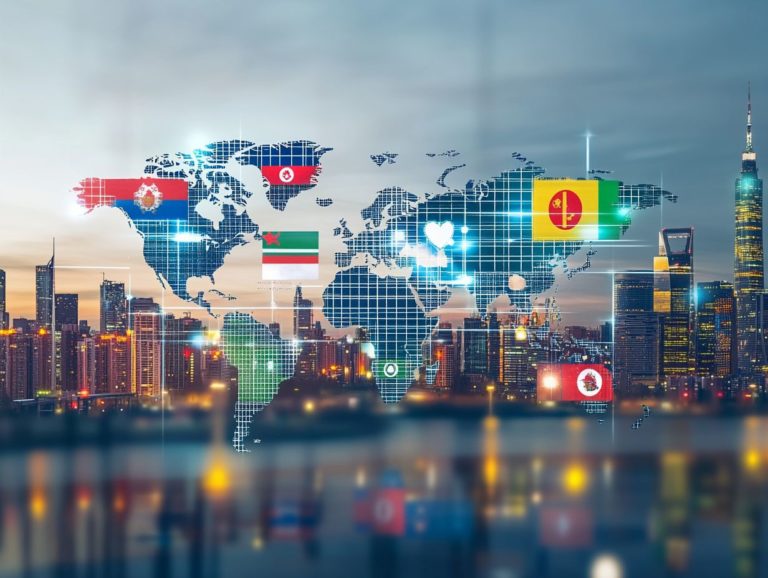International IP Law: A Beginner’s Guide
Intellectual Property (IP) is pivotal in supporting innovation and creativity across the globe. As our world becomes increasingly interconnected, understanding international IP law is essential for individuals and businesses alike.
This overview illuminates the essence of intellectual property, its global significance, and the diverse protections available ranging from patents and trademarks to copyrights and trade secrets.
You’ll encounter key organizations shaping IP law and gain an understanding of how these laws are enforced worldwide. Are you ready to protect your creative ideas?
Contents
Key Takeaways:

- International IP law protects creations such as inventions, brands, and creative works on a global scale.
- Patents, trademarks, copyrights, and trade secrets are the main forms of IP protection.
- Organizations like WIPO, WTO, and ITC play crucial roles in enforcing and regulating international IP law.
Understanding International IP Law
Understanding International IP Law is paramount for businesses navigating today s intricate legal landscape. This area encompasses essential aspects of intellectual property rights, focusing on managing and protecting innovations across diverse jurisdictions.
With the increasing significance of digital rights management and the need for effective enforcement strategies, you must adeptly maneuver through legal frameworks to safeguard your intellectual assets. This not only enhances your market position but also ensures compliance with critical international treaties like the TRIPS Agreement, along with conventions like the Paris Convention and the Berne Convention.
What is Intellectual Property?
Intellectual property (IP) encompasses the legal rights you hold for your creative innovations and original works. This includes trademarks, patents, copyrights, and trade secrets.
This legal framework fosters creativity and innovation by providing the protection needed for you to enjoy the financial rewards of your efforts.
Each type of IP serves a unique purpose: trademarks safeguard your brand identity, while patents protect your inventions, giving you a competitive edge in the market.
The registration process typically involves submitting an application to the appropriate authority, allowing you to secure your assets against infringement. Legal protection deters unauthorized use and boosts your company’s valuation, highlighting the crucial role of IP in driving business growth and sustainability.
Why is International IP Law Important?
International IP law is essential for your business growth and competitive edge. It offers a robust framework for managing and protecting intellectual property rights globally.
This legal structure safeguards your innovations and creative works while enhancing your brand identity, allowing you to stand out in a crowded marketplace.
When you protect your trademarks, you cultivate a unique and recognizable brand image that fosters consumer loyalty and trust.
Implementing effective IP management strategies helps you navigate challenges like infringement issues or counterfeit products, which can threaten your market position.
By proactively enforcing your IP rights, you can deter unauthorized use of your assets, maintaining your competitive edge and ensuring long-term success in both domestic and international markets.
Types of IP Protection
Types of IP protection include various legal mechanisms designed to shield your intellectual assets from unauthorized use.
This ensures that you, as a creator, hold exclusive rights to your innovations and original works, allowing your creativity to flourish without fear of infringement.
Start protecting your ideas today!
Patents

Patents grant you exclusive rights to your groundbreaking inventions. They give you the power to commercialize your ideas while preventing others from using, selling, or distributing your patented technologies without your permission.
This legal protection gives you a competitive edge in the marketplace. It makes it easier to secure funding and attract potential business partners.
By engaging in the patent registration process, you can bolster your intellectual property (IP) portfolio. This process involves thorough documentation and meticulous examination.
Effective IP management not only safeguards your rights but also increases the likelihood of lucrative licensing agreements. Patents play a crucial role in driving your business growth, enabling you to transform innovative concepts into profitable products while minimizing the risks associated with infringement.
Trademarks
Trademarks are unique signs that effectively distinguish your company s products or services from those of your competitors. They shape your brand identity and secure your legal rights in the marketplace.
The journey begins with thorough research to confirm that the trademark you choose is unique and not confusingly similar to any existing trademarks. Once you identify a suitable mark, register it with the appropriate authorities to secure your exclusive rights and legal protection against unauthorized use.
Maintain the distinctive character of your trademark to prevent weakening. This ensures consumers can easily associate specific qualities and values with your brand.
Such distinctiveness enhances brand loyalty and gives you a competitive edge. It enables you to command higher prices and build lasting trust among your customers.
Copyrights
Copyrights grant you legal protection for your original works whether literature, music, or art. They ensure you enjoy exclusive rights to reproduce, distribute, and display your creations.
This powerful legal framework protects your artistic creations, letting you focus on what you do best! It also gives you the power to monetize your work effectively.
The process of copyright registration is straightforward: simply register your work with the U.S. Copyright Office. This involves filling out an application, submitting a copy of your work, and paying a fee.
This formal registration significantly enhances your ability to enforce your rights against any infringement. It is a critical step for anyone keen on protecting their intellectual property.
By securing copyright protection, you can foster innovation and growth within your business. This allows you to invest in new projects without the looming fear of unauthorized use of your creative assets.
Trade Secrets
Trade secrets are the confidential jewels of your business those exclusive formulas, practices, and processes that give you a competitive edge. They’re safeguarded through legal instruments like non-disclosure agreements (NDAs), ensuring your proprietary knowledge remains under wraps.
These essential assets give you the power to innovate and stand out from competitors without the looming threat of your trade secrets being exposed. The importance of non-disclosure agreements cannot be overstated; they impose a legal duty on employees and partners to uphold confidentiality regarding sensitive information.
To cultivate a culture of secrecy and responsibility, you can implement robust measures such as:
- Employee training
- Restricted access to trade secrets
- Regular audits
By adopting these proactive strategies, you not only protect your intellectual property but also fortify your market position. This paves the way for long-term profitability and stability.
Key Players in International IP Law
Key players in international IP law encompass prestigious organizations like the World Intellectual Property Organization (WIPO), the World Trade Organization (WTO), and the International Trade Commission (ITC).
These entities work in concert to establish and enforce comprehensive legal frameworks that govern intellectual property rights across borders. Their collaborative efforts are essential in navigating the complexities of global intellectual property protection.
Don t wait! Secure your patent today to gain that competitive edge.
Start protecting your innovations now! Contact us for expert assistance in navigating IP law.
Your Ally in Protecting Creative Rights: World Intellectual Property Organization (WIPO)

The World Intellectual Property Organization (WIPO) is a specialized agency of the United Nations that helps manage creative ideas and inventions globally. It brings member states together and develops important international treaties.
WIPO also supports individuals by providing a variety of educational programs. These initiatives enhance understanding of IP rights and how to enforce them across different regions.
As a creator or innovator, these educational efforts empower you to protect your work effectively. You will be well-informed about your rights and the resources available to safeguard your creations.
WIPO supports developing countries by helping them establish strong IP frameworks. This ensures they can adapt to the rapidly changing global landscape.
This collaborative approach allows countries to share best practices, enriching global engagement with creative rights.
Shaping Trade: World Trade Organization (WTO)
The World Trade Organization (WTO) plays a crucial role in international trade relations, particularly through the Agreement on Trade-Related Aspects of Intellectual Property Rights (TRIPS). This agreement aligns IP laws among its member nations.
By creating a balanced framework for IP rights, the WTO ensures that all member countries meet certain standards, allowing smoother economic exchanges. This alignment encourages fair trade practices and protects inventors and businesses from infringement.
The WTO monitors compliance and addresses IP-related disputes, highlighting the importance of these standards in global economic governance.
As you navigate the complexities of IP management, the guidelines set forth by TRIPS will serve as a vital resource for protecting your creativity while promoting a fair trading environment.
Your Defender: International Trade Commission (ITC)
The International Trade Commission (ITC) is a key federal agency that investigates IP infringement and enforces trade laws, defending U.S. intellectual property rights.
By examining reported infringement cases, the ITC assesses the validity of IP claims and provides remedies. Its thorough investigations champion innovation and shape enforcement strategies with global implications.
The ITC collaborates with organizations like the WTO and WIPO, ensuring U.S. IP protection aligns with global standards. This unified strategy addresses disputes that transcend borders.
Enforcing International IP Law
Enforcing international IP law involves a comprehensive set of legal remedies designed to tackle IP infringement. This framework gives you the power to safeguard your creative ideas efficiently and confidently, even across different jurisdictions.
Legal Remedies for IP Infringement
Legal remedies for IP infringement offer various options:
- Litigation: This can lead to significant financial awards for lost revenue or profits.
- Injunctions: These can swiftly stop infringing activities, giving you immediate relief.
- Monetary Damages: These provide compensation for unlawful exploitation of your IP.
These remedies are essential for protecting your rights and can deter future violations.
While litigation can consume resources and time, it may yield substantial rewards. Injunctions offer quick action to prevent further damage.
The effectiveness of these remedies can vary by jurisdiction and case specifics, but together, they create a strong framework for you to enforce your rights and preserve your creative works.
Act now to safeguard your ideas!
International IP Enforcement Agreements

International IP enforcement agreements are essential for fostering cooperation among countries in the protection of intellectual property rights. They allow you to benefit from consistent enforcement strategies across jurisdictions.
These frameworks establish a standardized approach to addressing infringement. They promote collaboration through treaties such as the Agreement on Trade-Related Aspects of Intellectual Property Rights (TRIPS) and the Paris Convention for the Protection of Industrial Property. Such agreements highlight the importance of a unified front in the battle against piracy, counterfeiting, and other violations that threaten innovation and economic growth.
Clear guidelines and obligations allow countries to engage in discussions that enhance enforcement mechanisms. This ultimately creates a safer environment for you and other creators and businesses to thrive on a global scale.
Frequently Asked Questions
What is International IP Law?
International IP Law refers to the legal framework that governs the protection of intellectual property rights across national borders. It includes treaties, agreements, and laws that aim to protect creations of the mind, such as inventions, literary and artistic works, and symbols, names, and images used in commerce.
What are some examples of Intellectual Property (IP)?
Some examples of IP include patents (exclusive rights for inventions), trademarks (identifiers of brands), copyrights (protection for artistic works), trade secrets, and industrial designs. These are all forms of legal protection for various types of intellectual creations.
Why is International IP Law important?
International IP Law is important because it provides a legal framework for protecting and enforcing intellectual property rights globally. This fuels innovation and empowers creators, giving them the confidence to invest in their ideas without fear of theft or copying.
What are some challenges of International IP Law?
One of the main challenges is the diversity of legal systems and cultural attitudes toward intellectual property in different countries. This can complicate global enforcement and lead to issues like piracy and counterfeiting.
What is the role of international organizations in IP Law?
International organizations, such as the World Intellectual Property Organization (WIPO) and the World Trade Organization (WTO), play a crucial role in developing and implementing International IP Law. They provide a platform for countries to negotiate and agree on international IP standards, and they help enforce these standards through dispute resolution mechanisms.
How can I protect my IP rights internationally?
To protect your IP rights internationally, you can file for protection through mechanisms such as the Patent Cooperation Treaty (PCT) or the Madrid System for the International Registration of Marks. Additionally, working with legal professionals specializing in international IP law can ensure your rights are safeguarded in various countries.
Ready to take charge of your IP rights? Start exploring your options today!






